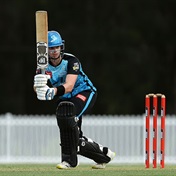
Johannesburg - In the mad scramble to apportion blame for the Proteas’ capitulation in the ICC Champions Trophy, AB de Villiers’ captaincy and Russell Domingo’s tenuous hold on his coaching position were predictable targets.
If the tournament showed us anything, it was that De Villiers may be a batting genius, but he captains by the numbers.
With questions around his captaincy, it is therefore logical to challenge his assertion post-elimination that he is the right man to lead the Proteas to the 2019 World Cup.
To win matches
And forget that the Proteas’ early exit exposed cricket’s hypocritical relationship with coaches – the captain is the man when the team wins, but it’s the coach’s fault the moment it loses – Domingo won’t exactly have been enthused to dust off his CV to meet Friday’s deadline to reapply for his job.
But to blame what happened in England on De Villiers and Domingo is to carry on with our typical short-sightedness to problem-solving and ignore a host of other issues.
The first elephant in the room is that a bunch of handsomely rewarded young men turned to jelly the moment they had to win games in a tournament, which beggars belief because, presumably, their lot in life is to win matches.
It was interesting to listen to the many arguments about whether the Proteas had choked this time because they simply didn’t turn up.
The purists’ definition of choking is being within sight of victory and bollocksing it up.
But surely knowing ahead of time that you have to turn up and play your best in a game and failing to is tantamount to choking ahead of time? Yet this isn’t just a Proteas thing, it’s a South African sport thing.
Kicking possession away
The best example came a few days ago when the Baby Boks (the Under-20s) – whose backline ran rings around their Argentine counterparts to qualify for the semifinals of the World Rugby Under-20 Championship in Georgia – barely used said backline in the semi against England.
Instead, a team in which five of the seven backline players have played flyhalf at some stage or another in their careers daftly tried to defend a five-point lead by kicking possession away (and badly) with 15 minutes left in the game.
The recent talk from the Proteas is that choking is practically a banned word in the team, which explains why they have not so far been able to confront it, let alone overcome it.
This in an age where a book has been written about how the All Blacks have overcome their historical choking to the point that they have become the only team in world rugby to defend a World Cup title.
By the looks of it, not many of our sporting chiefs have read James Kerr’s Legacy or former New Zealand coach Graham Henry’s interview with the Telegraph ahead of the 2015 World Cup final, where details of how the All Blacks overcame their mental demons are graphic.
Different state
“Mental strength is a difficult thing to understand and to execute,” said Henry two years ago.
“We had to get outside help to come up to speed in that area. The physical things are easy. Everyone can sweat ... but mental skill development is a relatively new area.
“When you are under pressure, and your brain goes to a different state and you end up running around like a headless chicken, the media call that choking.
"All the players have individual cues to stay in the now on the field.
“If they feel themselves slipping, they click on with that individual mental trigger to make them stay in the now.
"They practice that all the time. The coaches will try to put them under pressure so they choke in training by overloading them.”
Blaming De Villiers or Domingo also gives the rest of the team licence not to share in the burden of pressure.
For example, when JP Duminy fails again in a must-win game, it is expected it’ll be because he only has four one-day international (ODI) centuries – against Holland and Zimbabwe (three).
Same problem
And while we celebrate Hashim Amla’s “fastest to” milestones and 25 ODI centuries, nobody asks how many he has scored in a knockout game (none).
Yet, when De Villiers was out of the picture, the rest of the Proteas mucked in during tricky moments in games because they couldn’t outsource the burden of expectation.
The irony is that the signs before the Champions Trophy suggested the Proteas were on the right track – to get there, they need to embrace that choking is every bit the same problem as trouble with the short ball.
. sports@citypress.co.za
. Follow me on Twitter @Simxabanisa




 Publications
Publications
 Partners
Partners
























